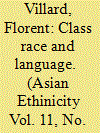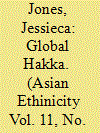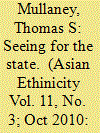|
|
|
Sort Order |
|
|
|
Items / Page
|
|
|
|
|
|
|
| Srl | Item |
| 1 |
ID:
099700


|
|
|
|
|
| Publication |
2010.
|
| Summary/Abstract |
This study investigates the discursive peregrinations of the 'Han' category in the writings of the Chinese revolutionary, theoretician and activist Qu Qiubai. In the papers he wrote at the beginning of the 1930s dealing with the questions of language and writing, the author made singular use of the concept 'Han' to talk about the language/writing of the 'Han' (Hanzi, Hanyu) as a racial or ethnic group (Hanzu). Qu elaborated a discourse which articulated and mobilized, sometimes in a contradictory manner, the 'Han' category both as a 'race' and as a social class. Going beyond the race/class dialectic, I will try to show that these texts question the territorial, cultural and ethnic boundaries of 'China' and its homogeneity. Following this argument, this paper demonstrates how Qu's attempt to define 'Chinese language(s)' helps us to elucidate the complex articulation between China as a discursive and spatial category, the 'Han' category, and the other nationalities in the Chinese space. By questioning the homogeneity of the linguistic identity of China, using the word zhongguohua, Qu Qiubai unveiled an unstable and fragile imaginary relative to China and its so-called majority ethnic group, the Han.
|
|
|
|
|
|
|
|
|
|
|
|
|
|
|
|
| 2 |
ID:
099699


|
|
|
|
|
| Publication |
2010.
|
| Summary/Abstract |
Literature on international migration from India in the past has focused on the formation and development of 'Indian diasporas'; that is, Indians who have moved to various parts of the world and maintain socio-economic, cultural and political lives in India as well as other countries. However, little attention has been paid toward 'temporary migrants' who have migrated to different countries with a temporary visa and in the course of time extended their visas to become 'permanent residents'. Temporary migration from India has become a common trend over the last two decades, especially since the acceleration of globalisation and the developments in the fields of information and communication technologies. Although it is argued that this type of migration took place in the past - for instance, Indians migrated to British, French, Dutch and Portuguese colonies during the nineteenth and early part of the twentieth centuries as indentured labourers for a period of three to five years and later extended their stays - what is new about the current trend is the new state policies of different host countries and the socio-economic and cultural background of the immigrants. This paper is an exploratory study of this contemporary phenomena of movement from 'temporary migrant' to 'permanent resident', a phenomena which has not been given much attention by academicians and policy makers in India. The present paper outlines this trend with an illustration of Indian H-1B visa holders in the United States.
|
|
|
|
|
|
|
|
|
|
|
|
|
|
|
|
| 3 |
ID:
099702


|
|
|
|
|
| Publication |
2010.
|
| Summary/Abstract |
This paper is based on a case study of a small group of Hakkas who have left the village-town of Beruas in the state of Perak on the west coast of the Malaysian Peninsula to make their homes overseas - mostly in cultures which are very different from the Hakka environment in which they grew up. It looks at: the reasons why they left their hometown; how they identify themselves in their new place of residence; who they married; their offspring in relation to the their mother tongue (Hakka) and traditions; how they see the future of 'Hakka culture' and the social and cultural costs of living overseas and marrying outside the dialect.
|
|
|
|
|
|
|
|
|
|
|
|
|
|
|
|
| 4 |
ID:
099701


|
|
|
|
|
| Publication |
2010.
|
| Summary/Abstract |
This article proposes a new understanding of the Ethnic Classification project (minzu shibie) undertaken in China's southwesternmost province of Yunnan in 1954 - a project in which social scientists and Communist Party cadres set out to determine which of the dozens, if not hundreds, of minority communities in the province would be officially recognized by the state. Specifically, this article argues that ethnologists and linguists played a far greater role in the Classification and early Chinese Communist governmentality than is typically assumed. The Chinese Communists did not teach themselves how to 'see like a state,' to use James Scott's formulation, at least not when it came to the fundamentally important problem of ethnic categorization. To the contrary, the history of the Classification project is one of an inexperienced Chinese state that was able to orient itself only by observing the world through the eyes of its social scientific advisors. The 'mentality' within early Chinese Communist Party (CCP) 'governmentality' was, in the case of the 1954 Ethnic Classification, in large part the mentality of the comparative social sciences.
|
|
|
|
|
|
|
|
|
|
|
|
|
|
|
|
|
|
|
|
|